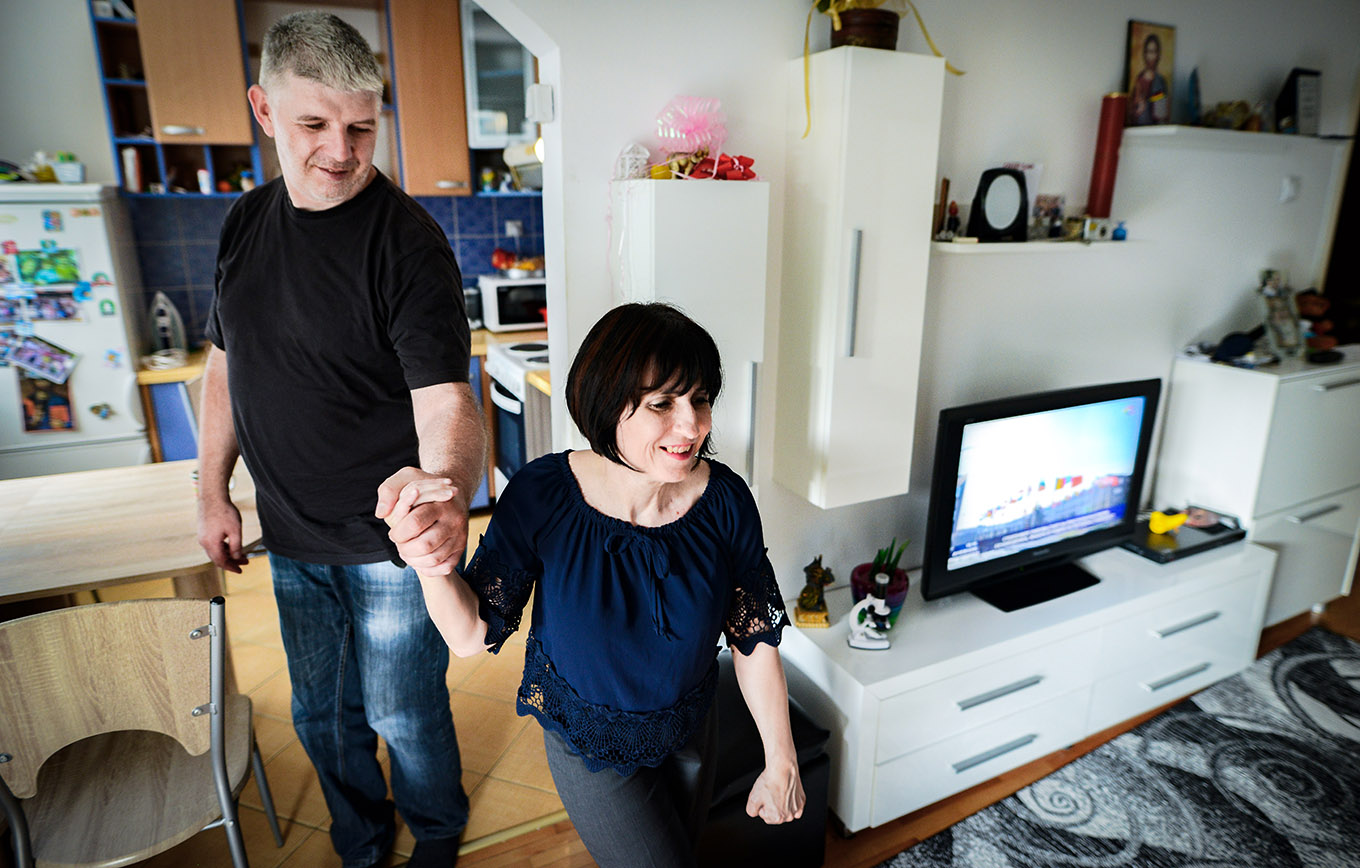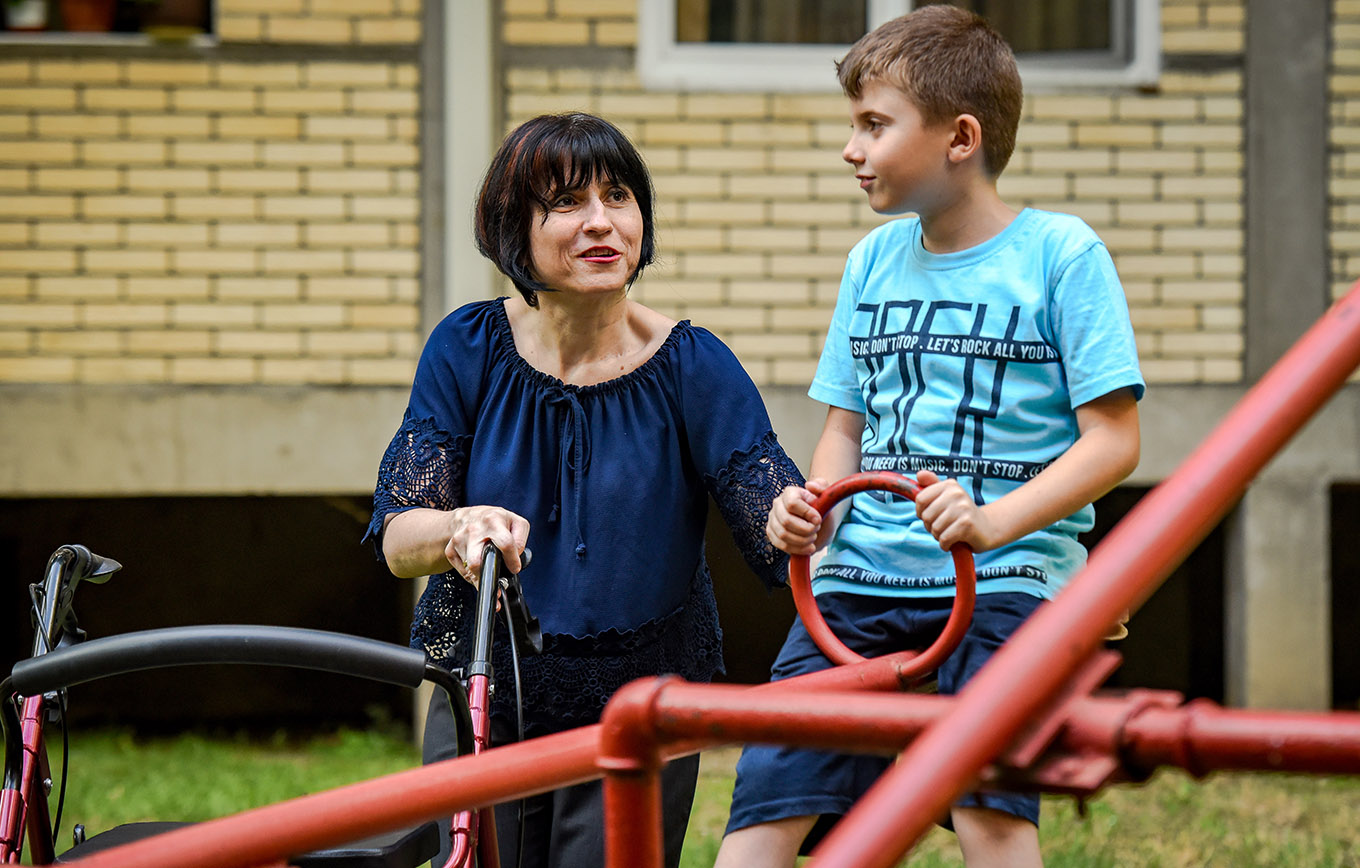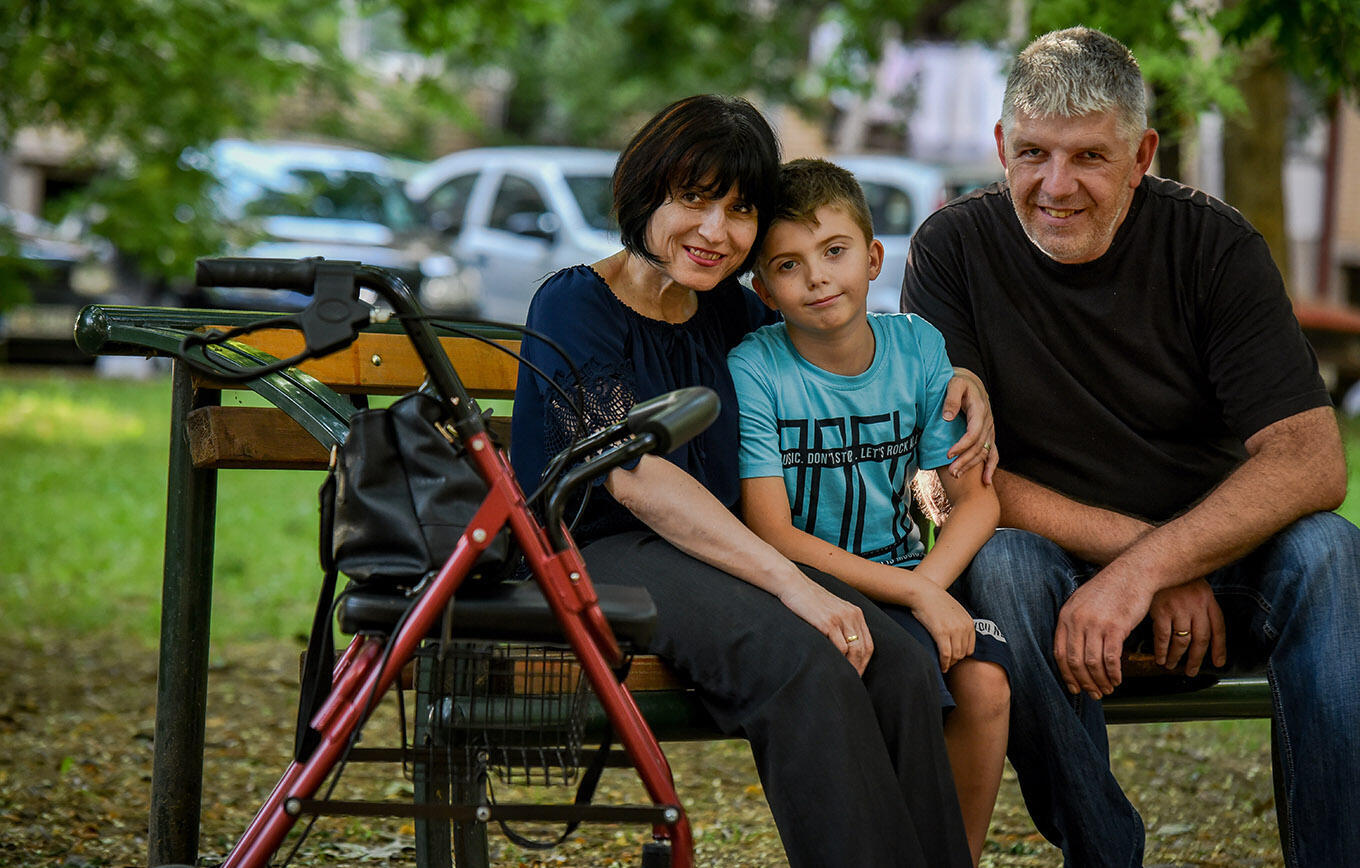SKOPJE, the Former Yugoslav Republic of Macedonia — Daniela’s brown eyes sparkle when she remembers the day her son was born. “They woke me up with the words, ‘You have a healthy baby boy,’” she recalls. “My heart was leaping with happiness. But my head was overwhelmed with thoughts of how my son would accept my imperfection.”
Daniela, 42, developed cerebral palsy in her lower limbs after she was born prematurely and spent her first 40 days of life in an incubator. “I can walk without assistance for only short distances,” she says.
Support from her large family, including her parents and two twin brothers, and her friends; the ambition to become educated; and the love she receives from her husband, Metodija, have helped Daniela face the many challenges posed by her condition. These include one major hurdle shared by many other people with disabilities: accessing family planning, maternity care and other sexual and reproductive health services.
According to research carried out in 2017 by UNDP, 48 per cent of women with disabilities in the Skopje region are not using gynaecological health services; in two neighbouring regions, this figure is above 65 per cent. Stigma, taboos, misperceptions and lack of accessible information and services all remain barriers for people like Daniela.
“The gynaecologist usually looks at you as if you are some kind of oddity when you say that you are a disabled person,” Daniela says. “There is a perception that we are asexual, or if we are sexual, that we are doing it in some wrong way.”
Stigma and self-esteem barriers
Worldwide, about 15 per cent of the population lives with some form of disability, 2 to 4 per cent of whom experience significant difficulties in functioning. Laws in the Former Yugoslav Republic of Macedonia, as in many other countries, guarantee their rights to sexual and reproductive health, but reality often lags behind. “People with disabilities have the right to decide freely and responsibly on the number and spacing of their children as well as to access information and education on family planning,” says Sonja Tanevska, UNFPA Assistant Representative, citing Article 23 of the UN Convention on the Rights of People with Disabilities, which the national parliament voted to ratify in 2011.
However, the negative and stereotypical attitudes in society towards people with disabilities often lead to stigma (including self-stigma) and psychological barriers that keep them from enjoying full sexual and reproductive health.

Daniela and Metodija at home in Skopje. Photo: UNFPA the Former Yugoslav Republic of Macedonia.
“Issues of sexual and reproductive health are generally taboo in our country, and for people with disabilities this taboo is even greater,” says Vesna Matevska, a psychologist and programme manager for HERA, a non-governmental organization and UNFPA partner. “The stigma is especially present when it comes to family planning, sexual relations and contraception.”
Lack of information and access to health services
Research carried out by HERA in 2016 shows that lack of information, communication difficulties and lack of privacy all inhibit the ability of people with visual and hearing impairments, among the most common disabilities, to make a free and informed selection of modern contraceptive methods.
“I don’t use birth control pills because I have to visit a gynaecologist to get a prescription,” one woman told HERA researchers. “He does not know sign language and if I use an interpreter I have no privacy.”
People with disabilities said they lacked education and resources on sexual and reproductive health, with 50 per cent of respondents saying they have no access to programmes for sexual and reproductive health and 47 per cent saying they have no quick and easy access to health care in general.
Another set of research by HERA, carried out in 2013 among focus groups of people with disabilities, identified marriage and family planning as their biggest obstacles, due to prejudices among the general population about the ability of people with disabilities to take care of themselves and of others.
Daniela, the mother from Skopje, experienced some of these doubts herself. “We thought that the period when my son, Damjan, was a toddler, just starting to walk, would be horrible for us,” she recalls. “Even my parents would say, ‘Watch out so he doesn’t push you!’ But believe it or not, Damjan would actually make room for me to pass, so he could pass after me.”
Trainings for family planning and education
UNFPA is working with its partners in the Former Yugoslav Republic of Macedonia to ensure that all people — including those with disabilities — have full access to sexual and reproductive health. On a policy level, UNFPA is engaging in advocacy dialogue with the Ministry of Health on procuring reproductive health commodities and ensuring that the governmental action plan on sexual and reproductive health and rights is fully funded. It is also working to develop and adapt clinical guidelines and training curriculums for health-care professionals, including those on sexual violence and clinical management of rape.
“We have been delivering trainings on family planning since 2015 in cooperation with the Centre for Continuous Medical Education at the Medical Faculty in Skopje. These trainings have reached more than 250 family doctors and 120 nurses,” says UNFPA Assistant Representative Tanevska. The family doctors receive separate trainings on sexual and reproductive health for people with disabilities, organized by UNFPA partner’s HERA.

Daniela and her son, Damjan. Photo: UNFPA the Former Yugoslav Republic of Macedonia.
“These trainings include a module on what it means to have available and affordable contraception methods, the needs of people with disabilities and the attitude of health professionals towards them,” says gynaecologist Katerina Stankova Ninova, one of the trainers and a partner of the Medical Faculty’s Department for Family Medicine.
Existing services can usually be adapted easily to accommodate people with disabilities; increasing awareness about the need to do so is the first, and biggest step.
“The idea is to have universal access and universal design. Everything that is done by the state should not be special or only for people with disabilities, but instead part of universal accessibility efforts directed towards the entire population,” says psychologist Matevska of the NGO HERA.
UN joint efforts to support people with disabilities
Across the Former Yugoslav Republic of Macedonia, some 400 people with disabilities currently live in institutional settings at three facilities which provide little or no individualized support. UNFPA has recently started working with UNDP, UNICEF and UN Women to ensure that these people can also enjoy their right to an independent life.
“Over the next two years, UNFPA will implement sexual and reproductive health and gender-based violence prevention and response activities among people with disabilities in the south-east region of the country,” says UNFPA Assistant Representative Tanevska.
She adds that in order to ensure local ownership and community empowerment, UNFPA and its UN partners will implement the project in collaboration with the members of the Platform for Sexual and Reproductive Health of People with Disabilities, led by the NGO HERA.
The activity seeks to foster acceptance and inclusion of people with disabilities in their local community, showing that they are one of us.
—Irena Spirkovska
This story was originally published by UNFPA the Former Yugoslav Republic of Macedonia



